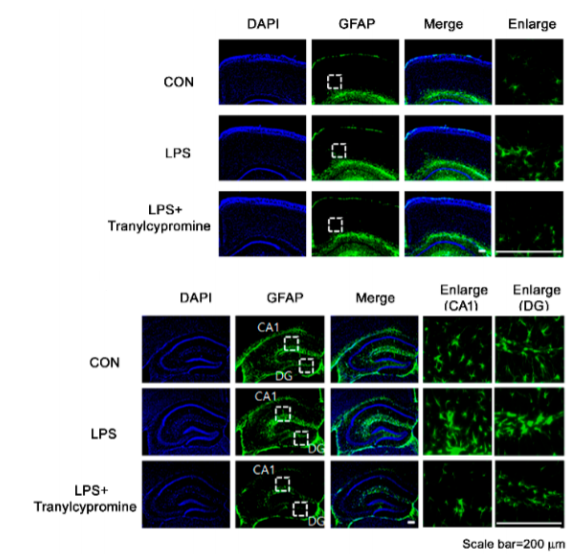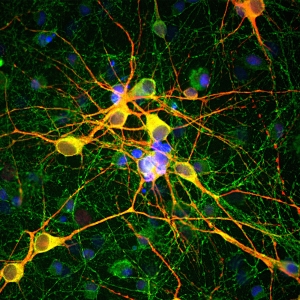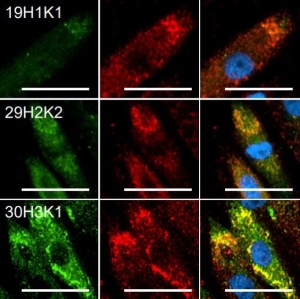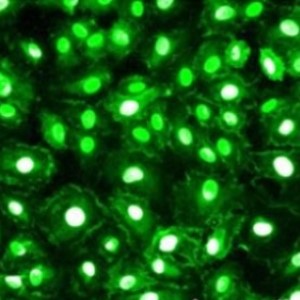We value feedback from our customers and take pride in seeing our products being used in meaningful research. Today, we'd like to highlight two recent publications using our GFAP antibodies in neurodegenerative disease research.
In the first publication, our rabbit GFAP antibody was used in a study that looked at how the DYRK1A inhibitor KVN93 regulates cognitive function, amyloid beta pathology, and neuroinflammation. Using a mouse model, they found that KVN93 reduced amyloid beta plaque levels, enhanced long term memory through better dendritic synaptic functions, and decreased neuroinflammation. These results suggest that KVN93 is a potential therapeutic drug for the treatment of Alzheimer’s disease and other neurodegenerative or neuroinflammation-related diseases.
Top Image: GFAP levels in the cortex and hippocampal CA1 (top) and DG regions (bottom) of 3-month-old 5x FAD mice injected with KVN93 or vehicle. KVN93 significantly decreases Aβ-mediated microglial and astrocyte activation in 3-month-old 5x FAD mice.
Learn more...
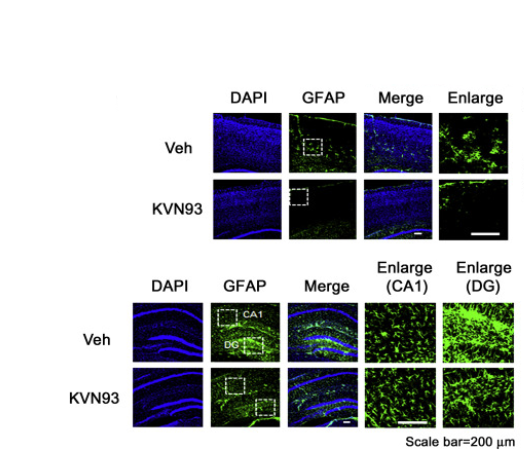
In another recent publication looking at potential therapeutics for neurodegenerative diseases, another one of our GFAP antibodies was used. This study looks at how the drug tranylcypromine, an inhibitor of Monoamine oxidase (MOA) used as an antidepressant and cancer drug, regulates LPS- and/or amyloid beta-induced neuroinflammation. They find that in both in vivo and in vitro mouse models, tranylcypromine can suppress neuroinflammation.
Bottom image: Tranylcypromine suppresses LPS-mediated microgliosis in wild-type mice.
You can check out all customer publications using our GFAP antibodies here. Additionally, you can find our neurodegenerative disease antibodies here and our neuroscience antibodies here.
Citations:
- Hyun-Ju Lee, Hanwoong Woo, Ha-Eun Lee, Hyongjun Jeon, Ka-Young Ryu, Jin Han Nam, Seong Gak Jeon, Hyun Hee Park, Ji-Soo Lee, Kyung-Min Han, Sang Min Lee, Jeongyeon Kim, Ri-Jin Kang, Young-Ho Lee, Jae-Ick Kim, Hyang-Sook Hoe. (2020). The Novel DYRK1A Inhibitor KVN93 Regulates Cognitive Function, Amyloid-Beta Pathology, and Neuroinflammation.Free Radical Biology and Medicine. doi: 10.1016/j.freeradbiomed.2020.08.030
- Hyun Hee Park, Kyung-Min Han, Hyongjun Jeon, Ji-Soo Lee, Hyunju Lee, Seong Gak Jeon, Jin-Hee Park, Yu Gyung Kim, Yuxi Lin, Young-Ho Lee, Yun Ha Jeong, and Hyang-Sook Hoe. (2020). The MAO Inhibitor Tranylcypromine Alters LPSand Aβ-Mediated Neuroinflammatory Responses in Wild-type Mice and a Mouse Model of AD.Cells, 9, 1982. doi: 10.3390/cells9091982
